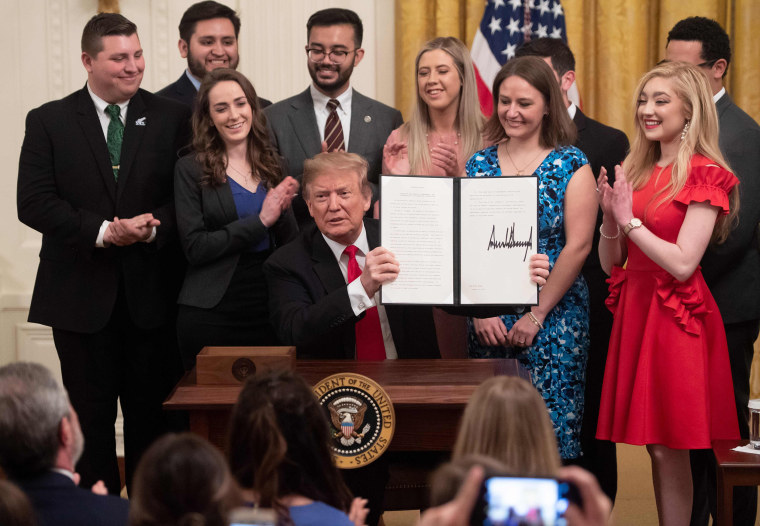On Thursday, President Trump signed an executive order stating that colleges and universities that accept federal funding, specifically federal research grants, must support “free inquiry.” The president has made clear — both in previous statements and in comments from the signing ceremony itself — that free inquiry means free speech. But here is some breaking news: Public universities that receive federal funding already have to adhere to the First Amendment. Private colleges have a greater ability to limit speech, but are directed to adhere to their “stated institutional policies” regarding the freedom of speech. Again, this is essentially directing private colleges to comply with their existing rules.
At the very least, this executive order is duplicative of current law and is merely symbolic. At worst, the order, while purporting to support free speech rights, will actually harm them.
At the very least, this executive order is duplicative of current law. At worst, the order, while purporting to support free speech rights, will actually harm them.
How could an executive order mandating that colleges and universities observe the First Amendment itself violate the First Amendment? First, it could lead colleges and universities to self-censor and limit the number of speakers of various ideological backgrounds who are invited to campus. It could also, on the flip side, make colleges and universities feel forced into inviting people to campus solely only on their differing perspectives.
The First Amendment protects both the right to speak and the right not to speak. Unfortunately, this executive order may threaten both.
But perhaps the more pressing legal problem is, who decides when a college or university is not adequately supporting free speech? Who determines when colleges and universities are complying with the First Amendment? The Trump administration has been conspicuously silent on how the executive order will be enforced. Presumably the answer is that a representative from the federal government will be making these determinations. Hence the executive order could introduce a new level of federal government intrusion and regulation onto colleges and universities.
This is a great time to remember what we are most worried about when we talk about protecting First Amendment rights: government intrusion. The First Amendment exists so that the government cannot tell us how and when we speak. And yet, this executive order could result, albeit indirectly, in doing just that.
SIGN UP FOR THE THINK WEEKLY NEWSLETTER HERE
Again, nothing on the face of the executive order says anything other than that colleges and universities that accept federal funds must do what they are already doing — adhering to the First Amendment and institutional policies regarding the freedom of speech. But in application, it seems likely the executive order will actually allow the federal government to police when colleges and universities are hosting too many of one type of speaker, or not enough of another. Here it is important to think about the context of the executive order.
Republicans regularly criticize colleges and universities for allegedly promoting liberal speakers and stifling conservative ones. These criticisms often point to a few high-profile examples that suggest oversensitivity, at the very least. For example, in 2017 students at Middlebury College in Vermont protested and attempted to shout down a conversation with conservative political scientist Charles Murray. That same year, students and activists at UC Berkeley protested a planned speech by conservative activist Mila Yiannopoulos, which was eventually cancelled after violence flared. There was also the case of Hayden Williams, a conservative activist who was punched in the face at UC Berkeley while trying to recruit new members to the conservative advocacy group Turning Point USA. In all of those cases, the colleges condemned the student protestors or attacker.
These examples may seem like good sound bites when listed on cable news. But it is a mistake to take several incidents of students protesting conservative speakers and use them to push through a systemic change that could severely undermine the rights its purportedly protecting.


